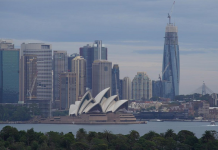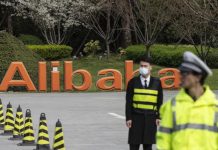Samsung Electronics said Friday it expects operating profit to tumble 56 percent for the second quarter of this year in the face of a weakening chip market.
The world’s largest maker of smartphones and memory chips has enjoyed record profits in recent years despite a series of setbacks, but is now struggling, with chip prices falling as global supply increases while demand weakens.
Operating profit for the April to June period is forecast to reach around 6.5 trillion won ($5.6 billion), down 56 percent from a year earlier, the firm said in a statement.
Revenue is expected to fall 4.2 percent to 56 trillion won. Samsung is scheduled to report final results later this month.
The firm is the flagship subsidiary of the giant Samsung Group, by far the biggest of the family-controlled conglomerates that dominate business in the world’s 11th largest economy, and it is crucial to South Korea’s economic health.
Samsung’s share price was down 1.2 percent in early trade.
Samsung launched its top-end S10 5G smartphone earlier this year, after South Korea won the global race to commercially launch the world’s first nationwide 5G network.
But in April it made a high-profile decision to push back the release of its new Galaxy Fold phones after reviewers provided with early devices reported screen problems within days of use.
While Samsung’s device was not the first folding handset, the smartphone giant was expected to help spark demand and potentially revive a sector that has been struggling for new innovations.
The South Korean firm had spent nearly eight years developing the Galaxy Fold as part of its strategy to propel growth with groundbreaking gadgets.
The firm is yet to announce its new release date.
Samsung supplies screens and memory chips for its own smartphones and Apple, and server chips for cloud companies such as Amazon.
But it is also one of the South’s major semiconductor manufacturers that are being affected by Tokyo’s recent restriction of exports to South Korea.
The measures — which raises the stakes in a protracted dispute over South Korean court rulings requiring Japanese firms to compensate victims of a wartime forced labour policy — are expected to significantly slow the export of several key materials used by Samsung.
Tadashi Uno, display research director at IHS Markit, said an end-product that could be affected by Tokyo’s newly announced restrictions is Samsung’s Galaxy Fold.
“The display of the Samsung Galaxy Fold — now in pre-order status in the United States — is produced utilising fluorinated polyimide film from Sumitomo Chemical, which is a Japanese electronic materials firm,” he said.
“South Korea-based Kolon Industries could act as an alternative supplier for the Samsung foldable smartphone display.”
Samsung is also set to unveil its latest phablet, the Galaxy Note 10, in New York next month, but analysts say it’s unclear whether its cutting edge products would do well in the global market.
“Unlike South Korea, many countries are still without 5G network,” said CW Chung, an analyst with Nomura Securities in Seoul, told AFP.
“And this gives overseas customers fewer reasons to buy a 5G phone, which also happen to be quite expensive.”
The smartphone giant’s reputation had taken a hit after the bribery conviction of Lee Jae-yong – the son and heir of the group’s ailing current chairman Lee Kun-hee.
The junior Lee was a prominent figure in the scandal that ousted former South Korean president Park Geun-hye and was sentenced to five years in jail in August 2017.
He was freed in February last year after several of his convictions were quashed on appeal.
The firm’s French subsidiary, meanwhile, is facing charges of deceptive marketing over its corporate ethics pledges after activists complained that the smartphone giant’s practices in its overseas factories violate human rights.
Based on information provided by other rights groups such as China Labor Watch, the NGOs allege that Samsung employs children under 16, subjects its employees to abusive working hours, that housing and labour conditions fail to meet basic standards and put workers in danger.
















